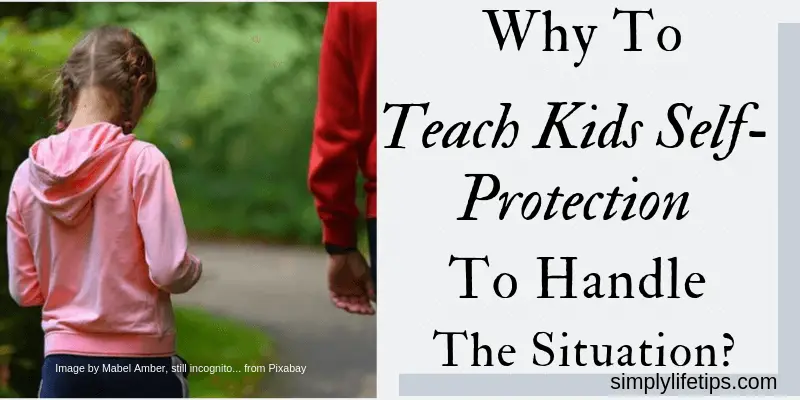Teaching kids self-protection is a critical aspect of parenting in today’s world. As children increasingly travel alone or with peers, they may encounter unfamiliar situations or individuals along the way. This underscores the importance of equipping our youngsters with the knowledge and skills necessary to protect themselves and navigate such circumstances confidently. In this blog, we will delve into the significance of teaching kids self-protection and explore practical strategies parents can employ to empower their children with essential life skills. From cultivating awareness of strangers to defining personal boundaries, we’ll uncover how parents can play a pivotal role in nurturing resilient, self-assured individuals. Join us on this journey as we prepare the leaders of tomorrow to navigate the world securely.
Why is it necessary to teach kids self-protection?
For parents, the safety and well-being of their children are paramount concerns. It’s a universal worry that often keeps parents up at night, fueled by the countless real-life stories of unfortunate incidents we hear about or read in the news on a daily basis.
In an increasingly complex world, one of the most effective ways to safeguard our children from potential dangers is by equipping them with specific street-smart skills. While it’s crucial for parents to play a role in this education, it’s equally important for educational institutions to provide proper training to children on how to handle unexpected situations when they’re alone.
However, it’s important to note that teaching self-protection doesn’t imply isolating children from the world or discouraging them from interacting with strangers altogether. In fact, many times, a stranger might be the helping hand a child needs in times of trouble. The key lies in striking a balance between fostering independence and ensuring safety, and that’s precisely why teaching kids self-protection is not just necessary but also a responsible and empowering choice for parents and educators alike. In this blog, we’ll explore the reasons why imparting self-protection skills to children is so vital in today’s world and how it can be done effectively.
It worries all parents about the safety of their kids when they are out of sight. It is a major concern for every parent because they watch and read many real sad stories daily.
The best way to protect kids from predators is to teach your kids specific street-savvy skills. Educational institutions also should give proper training to children how to handle any unexpected situation when alone.
The Little Girl’s Journey Towards Caution
In the earlier days, after school, it was a routine for the little girl’s mother to be waiting at the bus stop, ready to embrace her daughter and walk her home. However, as the girl reached the fourth grade, a sense of growing independence took hold. She believed she was old enough to make the short journey from the bus stop to her doorstep on her own. So, one evening, she brought up the idea with her family, and together, they decided that she should begin walking home independently.
On a seemingly ordinary afternoon, fate took an unexpected turn. As the young girl made her way home from the bus stop, two seemingly friendly ladies approached her. One of them, with a sweet demeanour, swiftly gained the trust of the innocent child. While this lady engaged the girl in conversation, her accomplice maintained a watchful eye.
With a voice that seemed as familiar as her mother’s, the lady assured the girl that she was a friend who had been asked to pick her up from the bus stop. However, she added a cautionary note, suggesting that it wasn’t safe to wear her gold earrings while travelling alone. To ease the child’s concerns, she promised to secure the precious earrings safely in a crumpled piece of paper and hand it over to her.
Trusting the lady whose words echoed her mother’s, the little girl consented and continued her journey homeward. Once she arrived, she excitedly recounted the day’s events to her mother and eagerly handed over the mysterious packet.
However, what unfolded left the child in shock. Instead of her cherished earrings, the crumpled paper contained nothing but pebbles, carefully placed to mimic the weight of the gold ornaments. The little girl couldn’t fathom when the lady, who had so skillfully won her trust, had swapped the contents of the package.
This harrowing incident left an indelible mark on the young girl’s psyche. She became wary of placing trust in others and began to blame herself for allowing someone to exploit her innocence.
Sadly, stories like these have become all too familiar in today’s media landscape. The pressing question remains: how can we prevent such incidents? While it may be challenging to entirely eliminate such risks, we can equip our children with the tools they need to protect themselves and respond confidently in uncertain situations. By teaching them precautionary measures and empowering them with resilience, we can help them navigate the complexities of the world with greater confidence and security.
Read Teach Your Kids Kindness Can Make A Better World
What are a few precautions for self-protection?
safeguarding oneself and teaching children self-protection is of utmost importance in today’s world. Here are several crucial precautions for self-protection:
- Stranger Awareness: The age-old adage “Don’t talk to strangers” still holds true. Teach your children when it’s appropriate to engage with strangers and when it’s not. Make them aware that not all strangers have good intentions.
- Recognizing Uncomfortable Situations: Instruct your kids to be wary of situations where strangers offer rides, and treats, or ask for help with questionable tasks. Encourage them to trust their instincts and, if uncomfortable, to firmly say “No!” and promptly leave the area. Make it clear that they should never keep secrets about such encounters and should report them to trusted adults like parents or teachers.
- Open Communication: Foster an environment where children feel comfortable sharing their experiences and concerns. Approach these conversations with love and support rather than anger, as their emotional well-being is paramount.
- Judging by Actions: Emphasize the importance of judging people by their actions rather than appearances or sweet talk. Many child molesters and abductors appear ordinary and friendly. Encourage kids to be cautious and not to judge solely based on appearances.
- Selective Trust: Teach children the importance of selective trust, especially when travelling alone. While some strangers may be trustworthy, others may not have their best interests in mind. Remind them to be cautious when relying on strangers in situations like watching over belongings.
- Smartphone Addiction: Address smartphone addiction in children, making them aware of the problems associated with excessive screen time. Encourage a balanced use of technology in their lives.
- Social Media Caution: Discuss the potential risks of social media with children and teenagers. Remind them never to share personal or family details and photos with strangers online and to avoid posting sensitive information.
- Phone Call Scams: Warn about phone call scams from unknown numbers, where scammers may pose as bank officials. Teach them to never share personal information over the phone without verifying the caller’s authenticity.
By imparting these precautions and fostering open communication, we can help our children navigate the complexities of the modern world with greater confidence and safety.
Read How to spread awareness and help to stop child trafficking?
Final Thoughts
In conclusion, instilling self-protection precautions in our children is an indispensable responsibility in today’s complex world. By teaching them to be cautious, aware, and discerning, we provide them with the tools they need to navigate life’s challenges safely. These lessons not only enhance their physical security but also empower them to make sound decisions and trust their instincts. In a society where potential risks are ever-present, these precautions are a vital component of a child’s education, fostering independence while ensuring their well-being.
Teach your teenagers about smartphone addiction problems and solutions.
How To Avoid Teaching Children Bad Lessons?
What do you think, should we trust strangers?
Have you experienced any sad incidents in your life from strangers?
How do you teach your kids self-protection?
I appreciate your visit. I trust you found the post enjoyable.
Remember, Sharing Is Caring! Feel free to share this post on your social media and other networks to help others discover it.

Mathukutty P. V. is the founder of Simply Life Tips. He is a Blogger, Content Writer, Influencer, and YouTuber. He is passionate about learning new skills. He is the Director of PokketCFO.
He lives with the notion of “SIMPLE LIVING, CREATIVE THINKING”. He Believes – “Sharing is caring.” and “Learning never ends.”



